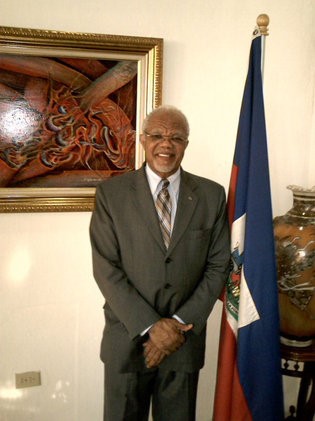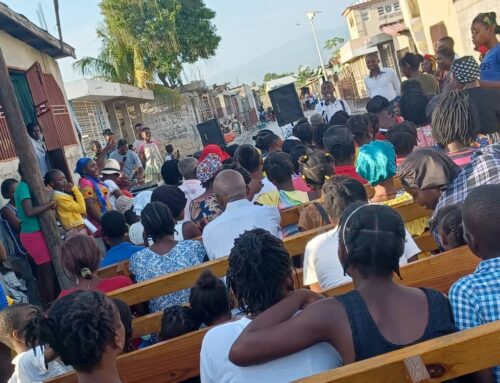Jean Rénald Clérismé, former priest and Haiti foreign minister
By Jacqueline Charles
Courtesy of Linda Marc-Clérismé
Former Roman Catholic priest and Haiti foreign minister Jean Rénald Clérismé was an advocate of Haiti’s rural poor. He died Oct. 29. He was 75.
When Yvrose Gilles heard Haiti’s long-suffering peasants had lost a valiant voice, with the passing of former Foreign Minister Jean Rénald Clérismé, she couldn’t help but note the unfortunate timing.
“He was truly needed as a diplomat at the OAS meeting of Oct. 29 to represent Haiti,” Gilles, a human rights activist and South Florida resident, penned on Face book. “Haiti and the world will need seasoned diplomats like Dr. Clérismé to ensure that human rights and the citizenships rights of all Dominicans are respected regardless of their ethnic background of the color of their skin.”
Clérismé, a former Roman Catholic priest and expert on the plight of Haitian farmers in the Dominican Republic, died Oct. 29 in Port-au-Prince.
He was 75.
That same day, the Organization of American States in Washington, listened to discussions about a Dominican Republic court ruling that strips citizenship rights from Dominican-born children of Haitian immigrants dating back to 1929.
Clérismé fell ill at the end of a political meeting and was rushed to a hospital. The cause of his death is still being determined.
His life and work on behalf of Haiti’s rural poor will be celebrated Friday at St. Louis Roi de France in Port-au-Prince’s Turgeau neighborhood. A 10 a.m. funeral Mass will be conducted by the Montfortains order, the community he belonged to as a priest. It will follow a 9 a.m. civil ceremony led by the foreign affairs ministry, which will escort the body Saturday to Clérismé’s hometown in Arniquet in southwest Haiti. There, he will be buried in the family plot.
Clérismé was born Nov. 7, 1937 in Chateau, a community in Arniquet into a rural Haitian family. He served 22 years as a priest, pastoring to the poor on one hand and helping them organize into unions, on the other. His fight for land rights and literacy program on their behalf often put him at odds with the Church hierarchy, and Haiti’s militarized regime. A friend of former Haitian President Jean-Bertrand Aristide, he also was a friend and collaborator of Jean-Marie Vincent, a fellow Montfortain priest and well-known peasant movement organizer who was assassinated in 1994.
“Rénald believed Haiti’s future should lie with those who formed the backbone of the country’s historical strength: the people still known in Haiti as the peasants,” said author Amy Wilentz, who called him a friend and mentor. “He came from that class, and as a priest in the Northwest Department in the turbulent 1980s, he witnessed firsthand the peasantry’s continuing struggle against powerful local families, politicians, and armed militias, just trying to hold on to the small plots that provide subsistence living in such areas.”
Haiti’s farmers and their families, Wilentz said, “should be very sad now, because there are few people with access to power who care about them today the way Rénald did throughout his life, and who are willing to use every bit of their energy and intelligence to help them dig out of utter penury.”
Outside of Haiti, Clérismé was instrumental in the founding of the Parish Twinning Program of the Americas (PTP0A). More than 300 U.S. Catholic parishes are connected to Haitian parishes and projects through the program.
After leaving the priesthood, Clérismé became a liberation theologist. Later, his activism temporarily detoured into academics, and later evolved into politics. In 1996, he earned a Ph.D in anthropology from Yale University, where he first met his wife Linda Marc-Clérismé. His dissertation thesis was on Haitian migrant peasant workers in the Dominican Republic.
A former Fulbright fellow and authority on Haitian culture, religion and its rural class, Clérismé also held master’s degrees in sociology and anthropology from the State University of Haiti and New York University. He also had an undergraduate degree from France.
In the early 2000s, he served as either Haiti delegate or ambassador to several global organizations including the World Trade Organization, the International Trade Center, the United Nations Conference for Trade and Development, and the International Telecommunication Union. He also was a delegate to the International Atomic Energy Agency.
In 2006, he was tapped to serve as minister of foreign affairs and religions as a member of President René Préval’s newly formed 18-member cabinet.
“He was passionately attached to the welfare of his country and its people and that that was made clear during his term as foreign minister and during his participation in the councils of the Caribbean Community,” said Colin Granderson, assistant secretary general for the 15-member Caribbean Community regional bloc Haiti belongs to.
After Haiti’s government changed in 2008, Clérismé remained in Préval’s cabinet advising him in several areas including Haitian-Cuban relations.
“I appreciated him as a member of my cabinet,” Préval told the Miami Herald. “But where I really appreciated him was his work on behalf of the peasants.”
Marc-Clérismé said there are many things she will remember about her husband. The two first met in the 1990s when Clérismé enrolled in the sociocultural anthropology program at Yale. But their May-December romance – she’s younger – didn’t start until 2005. Four dates, an engagement, and two years later, the two exchanged vows at the United Nations.
He later admitted to her that while he had always been attracted to her, he hesitated because she was too young when they first met, and he didn’t want to interrupt her academic studies.
“He was a wonderful friend, partner and mentor,” said Marc-Clérismé, who also holds several advanced university degrees in public health and pharmacology. “He had a keen intellect, was adventurous, always full of energy.”
“Despite his abrupt death, his presence in my life has grounded me forever,” she said.
After Haiti’s devastating Jan. 12, 2010 earthquake Clérismé told Yale Alumni magazine that the disaster made him realize, the weakness and vulnerability of everything in life.
“Life is precious, but at the same time, it’s very fragile. We have to pay attention to everything we have to do – each minute, each second, counts in human life,” he said. “We don’t have control of everything that’s going on.
“Now I am aware of the relativity of life,” he added.
In addition to his wife, Clérismé is survived by son Jean Reginald Clérismé from a previous relationship; seven brothers and sisters, and a host of relatives and friends.





